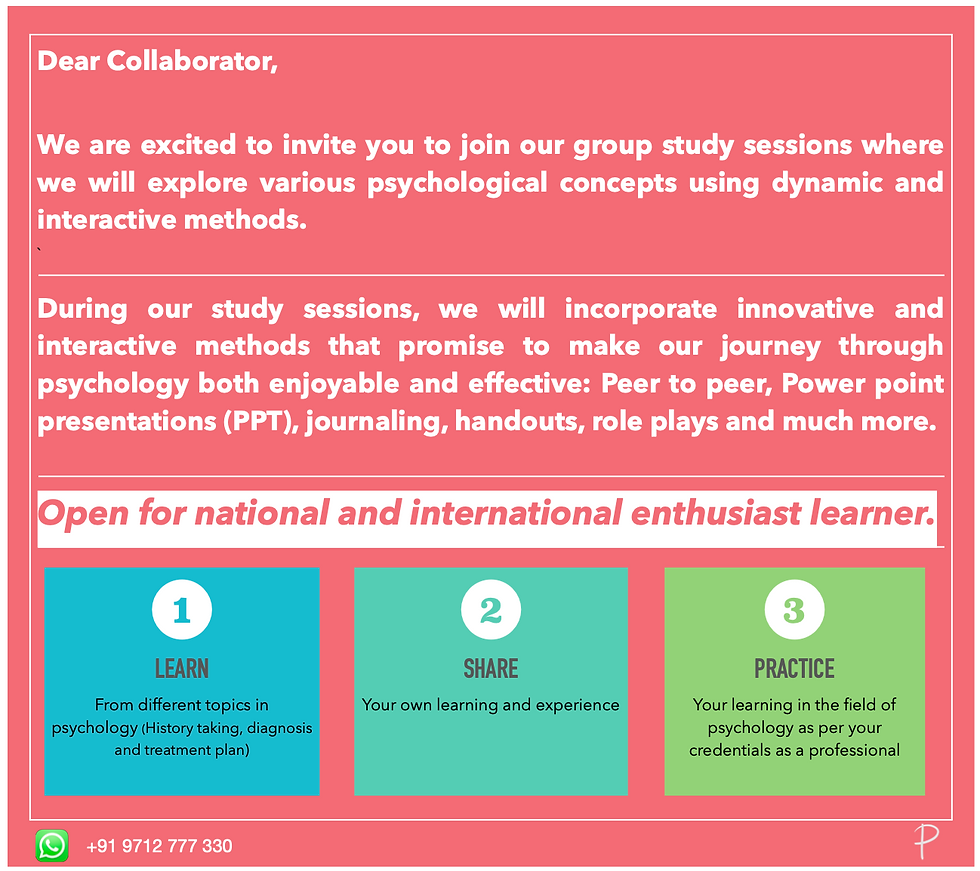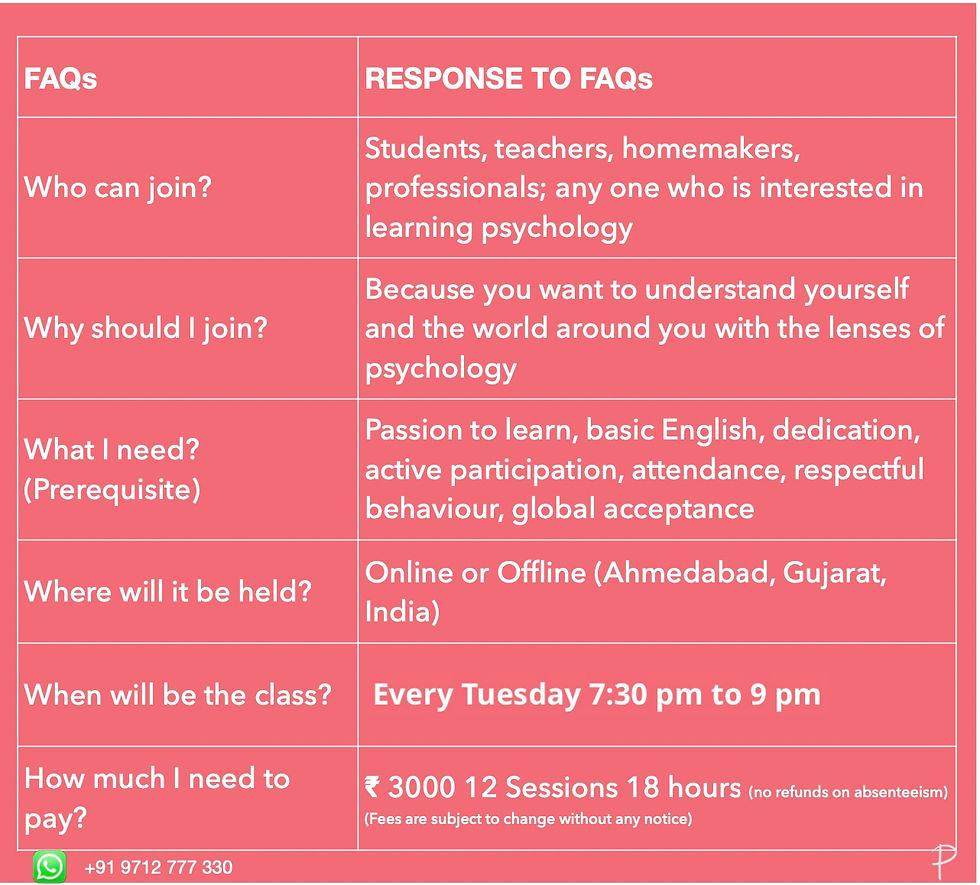(Psychology education program by Parita Sharma)
Every Tuesday (7:30pm to 9pm)
The more you know, the more you know you don't know - Aristotle

Cognitive Collaborators is a group study platform with the aim of collaborative learning where a small group of individuals come together to study and review academic material related to psychology. It involves sharing knowledge, discussing concepts, and helping each other understand and retain information. Cognitive Collaborators can take place in various settings, such as office, classrooms, libraries, or online platforms, and it is can be used by students or interested individual at different levels of psychology education, from high school to university, from home makers to professionals.
Benefits of Group Study:
Shared knowledge and perspectives: Each member brings their own understanding and insights to the group, enhancing the overall learning experience.
Clarification of doubts: Group study allows participants to ask questions and seek clarification from their mentor and peers, leading to a deeper understanding of the subject matter.
Improved retention: Explaining concepts to others helps reinforce learning and improve memory recall.
Different learning styles: Group study caters to diverse learning styles by accommodating visual, auditory, kinesthetic and practical learners through discussions, presentations, and hands-on activities.
Motivation and accountability: Studying with others can increase motivation and accountability as members encourage and challenge each other to stay focused and meet study goals.
Time management: Collaborative study sessions can help distribute workload, allocate study time effectively, and keep track of progress.
Skill development: Group study fosters communication, teamwork, critical thinking, and problem-solving skills, which are valuable beyond the academic setting.
Study Guide : Cognitive Collaborators:
Set clear objectives: Define the goals and topics to be covered during the study session.
Establish a schedule: Plan regular study sessions with a specific duration and adhere to the agreed-upon timetable.You are expected to do the HW and follow up reading.
Allocate roles: Assign different responsibilities to group members, such as note-taking, facilitating discussions, or preparing practice questions.
Create a conducive environment: Choose a quiet and well-lit study area with minimal distractions.
Active participation: Encourage all members to actively engage in discussions, ask questions, and contribute their knowledge.
Stay focused: Minimize distractions, such as mobile phones or unrelated conversations, to maintain concentration on the study material.
Rotate leadership: Allow different members to take turns leading discussions to ensure equal participation and shared responsibility under the mentorship of Parita Sharma.
Review and summarize: At the end of each session, recap the key points discussed and note any areas that require further clarification or individual review.
Remember, the effectiveness of group study depends on the commitment and cooperation of its members. It is essential to strike a balance between social interaction and productive studying to make the most of this collaborative learning approach.
Cognitive Collaborators FAQs

Q. Would sessions make any difference?
It depends on your readiness to adapt, accept and act on changes discussed during the sessions.
Q. What can we expect from the mentor?
You can expect creativity, safe space, sharing of her vast experience, professionalism, honesty, transparency, accountability, respect, trust, attendance, commitment, participation, and open doors for learning and sharing.
Q. What can my mentor and fellow participants expect from me?
Honesty, transparency, accountability, respect, trust, attendance, commitment, participation, and open doors for learning and sharing.
Q. Do I receive any certificates?
It’s not a certificate program. The idea is to keep sharing the knowledge in the realm of psychology.
Q. When is the date of the compilation?
This is an ongoing platform for learning and sharing psychology. However students have to re-enroll after 12 session.
Q. What if I miss the sessions, terminate the program, or get rusticated from the program?
Please note there will be no refund. In case you remain absent, know that we cannot recreate a session for you and it would be your loss and your responsibility to catch up with your peers.
Q. What are my chances of getting suspended?
Failure to respect and participate or if you have any mentally affected adjustment issues.
Q. What is the process to take admission?
Send the message on whatsapp number +919712777330
You will be notified of the induction scheduled, followed by the interview, if you pass the interview, you will be guided further about the admission procedure and payment procedures.
Glossary:
Cognition
Cognition refers to the mental processes and activities related to acquiring, processing, storing, and using information. It encompasses various higher-order mental functions such as perception, attention, memory, language, problem-solving, reasoning, and decision-making. Cognition is a complex and multifaceted process that enables individuals to understand, interpret, and interact with their environment.
Key components of cognition include:
Perception: The process of organizing and interpreting sensory information from the environment, allowing individuals to make sense of the world around them.
Attention: The ability to selectively focus and concentrate on specific stimuli or information while filtering out irrelevant or distracting information.
Memory: The capacity to encode, store, and retrieve information over time. Memory involves different stages, including sensory memory, short-term memory, and long-term memory.
Language: The system of communication that involves the comprehension and production of spoken, written, or sign symbols. Language allows individuals to express their thoughts, convey meaning, and engage in complex social interactions.
Problem-solving: The cognitive process of identifying and resolving difficulties or obstacles to reach a desired goal. Problem-solving often involves analyzing information, generating potential solutions, and evaluating their effectiveness.
Reasoning: The cognitive ability to draw logical inferences, make deductions, and reach conclusions based on available information and prior knowledge.
Decision-making: The process of selecting a course of action among available alternatives. Decision-making involves evaluating options, considering consequences, and making choices that align with goals and preferences.
Cognition is influenced by various factors, including genetics, development, education, experience, and cultural background. Understanding cognition is essential in fields such as psychology, neuroscience, education, and artificial intelligence, as it provides insights into human thinking processes and behavior.
Collaborators
The term "collaborators" refers to individuals or groups who work together towards a shared goal or objective. Collaboration involves cooperative efforts, joint participation, and synergy among individuals who bring their diverse skills, knowledge, and perspectives to achieve a common purpose.
Collaborators typically engage in activities such as sharing information, exchanging ideas, coordinating tasks, and making collective decisions. They combine their individual strengths and resources to enhance productivity, creativity, and overall outcomes. Collaboration can occur within various contexts, including work environments, academic settings, research projects, artistic endeavors, and community initiatives.
Characteristics of effective collaborators include:
Communication: Collaborators actively exchange information, express their thoughts and ideas, and listen to others to ensure effective understanding and coordination.
Trust: Trust is crucial for successful collaboration. Collaborators have confidence in each other's abilities, integrity, and commitment to the shared goal.
Respect: Collaborators value and appreciate the perspectives, expertise, and contributions of each team member, fostering an inclusive and supportive environment.
Flexibility: Collaborators are open to different viewpoints and approaches, willing to adapt and compromise to find the best solutions.
Cooperation: Collaborators willingly cooperate, collaborate, and assist each other, recognizing that collective efforts yield better results than individual endeavors.
Accountability: Collaborators take responsibility for their assigned tasks and contribute their fair share to the group's overall success.
Conflict resolution: Effective collaborators can navigate and resolve conflicts constructively, addressing disagreements or differences of opinion in a respectful and productive manner.
Collaboration offers numerous benefits, including enhanced problem-solving, increased innovation, improved decision-making, expanded knowledge sharing, and strengthened relationships among team members. By pooling their resources and expertise, collaborators can achieve goals that may be beyond the reach of individuals working alone.

Comments